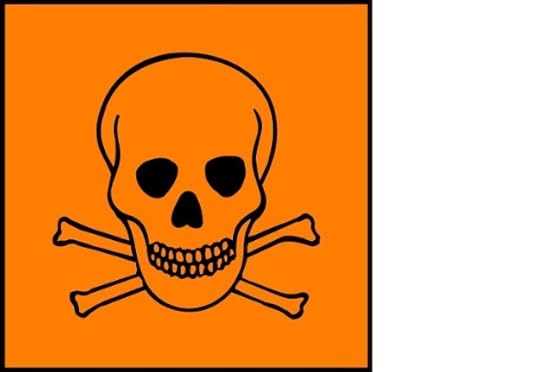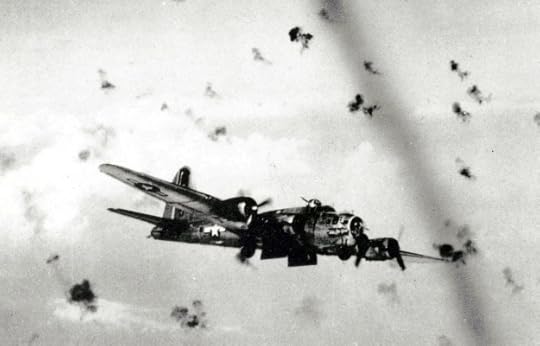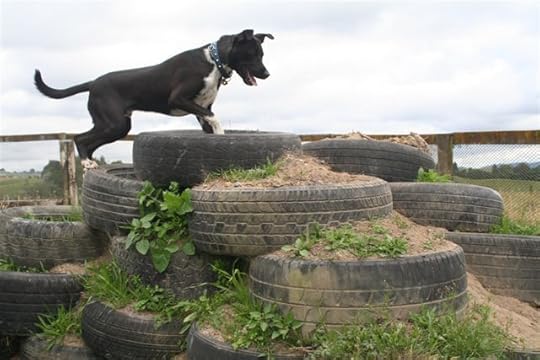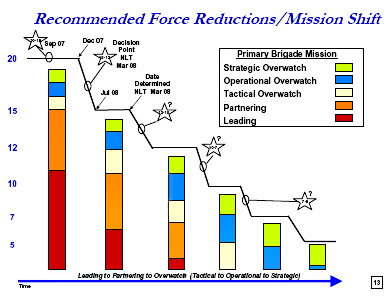Thomas E. Ricks's Blog, page 197
March 5, 2012
Medium rare: Some thoughts from an Afghan war vet on the Quran burning riots

By "_B_"
Best Defense frequent commenter
I'd like to analyze the riots currently going on in Afghanistan by breaking down who did what and why.
1. Some ISAF guys (presumably detainee handler MPs) attempted to dispose via burning some Qurans that had been written in by detainees in an attempt to pass each other notes. Being idiots, they didn't inquire about proper Quran disposal procedures. Being REAL idiots, they didn't burn them thoroughly but just sort of scorched some of them.
2. Some Afghan garbage haulers working on the FOB found the half-burned Qurans. Being Muslim, they got riled up and snuck them off-base. (I presume the scorched Qurans seen in some photographs of demonstrations comes from Bagram and was not purposely burned by Afghans for propaganda purposes.)
3. The gate guards let them through without a proper search. You have to presume that all kinds of other paperwork is walking through the gate (and not being publicized).
4. Presumably, the trash haulers brought this material to someone who made the call to publicize it. Either local political or religious authorities, or the Taliban. After some kind of analysis, these guys decided to exploit the scorched Qurans in their hands as a PSYOP.
5. At this point, if the U.S. had a functional and integrated SIGINT, HUMINT and Counterintelligence providing coverage in the vicinity of Bagram, they would have been inside the enemy's OODA loop and known what was going on. They apparently don't have such an operation and were caught by surprise. It's completely understandable -- Bagram is only ISAF's biggest base. Apparently, the talent and resources are pooled to support the pipe hitters who are snatching and killing Talib leadership, and there's not enough left to let anyone know what's going on outside the front gate. The fact that HUMINTers have been FOB-bound for at least the last half-decade due to retarded safety considerations which became a self-fulfilling prophecy doesn't help much.
Had military leaders known what was going on, they would have theoretically been able to stop it by showing up to the key players' houses and making them offers they could not refuse, e.g., "take this money, give me the burned Qurans and forget this ever happened, or we'll kill you and your whole family," and/or come up with a PR plan to discredit these guys and make them look like liars (Hey, it's a war -- bad things happen.) Or they could have used a brute force approach and bribed the tribal leaders of the Afghans living around U.S. bases to have them keep their guys from protesting. In practice American PSYOPs mostly consist of printing up hackneyed agitprop and posting it on walls/dropping it from aircraft/reading it through loudspeakers at the local populace.
6. Upon having this information publicized and being invited by their local Taliban representatives to engage in rioting, thousands of Afghans did so. They did this even though every ISAF base has a well-defended perimeter and crowds, no matter how fervent, are notoriously bad at stopping 7.62 and even 5.56.
As a guy who's once faced down an angry Afghan mob (small, about 120 guys,) I'd like to point out that contrary to common wisdom, they are not, in fact, irrational rage-monkeys. Afghans do not survive in a harsh, Malthusian environment by being bad at cost-benefit analysis. They knew that ISAF soldiers, driven by their fear of their commanders' response, would try to avoid lighting them up. And they were right. The fact that some of the posters were in English during this first wave of protests makes me think that this was a fairly carefully planned Taliban PSYOP aimed at the American media. But from the standpoint of the average rioter, outrage and rioting are fun and potentially profitable -- there's good loot to be had from overrunning a U.S. base.
7. The ISAF commander, General Allen, apologized profusely to "to the president of Afghanistan, the government of the Islamic Republic of Afghanistan, and most importantly, to the noble people of Afghanistan" and assured everyone that measures were being taken to ensure this would never happen again, ever. I personally suspect that GEN Allen, deep down inside, has not drank the COIN Kool-Aid and does not really care about the noble people of Afghanistan. Contrary to the tone of this message, he is not wrought with remorse and contrition and would, if he could, empirically prove the above thesis about how bad crowds are at stopping 7.62 and 5.56. At the very least, given free rein, he would follow the classic PR algorithm when confronted with embarrassing facts -- lie, deny and make counteraccusations. But GEN Allen has learned the lesson presented by GEN McChrystal -- give the U.S. media something juicy to dig into, and they'll tell the president to fire you -- and he will. Therefore, some public belly-crawling was in order, despite its predictable effects on the Afghan people's behavior.
8. Emboldened by the commander of ISAF setting the tone for subsequent crowd control and public relations efforts, more Afghans joined the riots. A few of them finally got themselves shot by U.S. troops forced to decide whether to get overrun and lynched or risk their careers. Of course, had we firmly established right off the bat that as long as there's a war on, any demonstrations in the vicinity of U.S. bases will get brutally crushed, none of this would have happened.
9. Also, some insurgent infiltrators of the GIROA and ANSF capped a few Americans. Nothing new there, it's been going on for a while, and presumably without the Quran burning controversy these infiltrators would have done the exact same thing eventually, but it's being used synergetically for maximum PSYOP impact. Not being constantly distracted by red-faced sergeant majors, reflective belts and hourly powerpoints, even the Taliban can figure this stuff out. Effective PSYOPs -- so simple, even a caveman could do it!
The problem of unreliable Afghan troops is inherent in the relationship between ANSF and ISAF, where the latter "advise" the former instead of being integrated into a mixed colonialist structure. But such structure is politically impossible. Any senior officers publically advocating one will be set upon by the American media and academia, which will say mean things about them, compare them to King Leopold and other bad colonialist oppressors of the past, and get them fired by their civilian leadership. Therefore the sham of "independent" Afghan security forces continues. These forces vet their personnel about as well as they do everything else, with the result that they are full of guys with either mixed or treasonous loyalties. The advisors embedded in these security forces have no command authority or any real leverage over their advisees, and are reduced to publically praising the whole arrangement while waiting out their tour and praying they don't get capped in the back of the head.
10. The president apologized to Afghans via a note sent to Hamid Karzai. Possible reasons for this action: 1) The president's well-documented penchant for apologizing to the world for American actions. 2) Having been elected by the American media, the president is afraid that he might get unelected by it, and is propitiating its representatives by doing what they expect. 3) The president (or his advisors) plan to use the predictable result of demonstrating to the Afghan people that our weakness runs all the way to the top to incite them to keep rioting and attacking U.S. bases. This will be used to demonstrate to the U.S. press and think tanks that the war has failed and the only thing left to do is to pull out. Beginning a pullout of all or most conventional U.S. forces from Afghanistan around the spring or summer would give the president a popularity boost, assuming the Taliban could be bribed or induced to hold off on any mass offensives until after the election. While seemingly farfetched, this scenario would be well within the time-honored American political tradition where the Progressives and the guys killing American troops make an informal and unspoken alliance for mutual benefit (see: Korea, Vietnam, Iraq.) I wouldn't put something that wicked past our leadership, but it does seem a bit too complicated and well-planned.
11. Most likely outcome -- a negative feedback loop, where an intensification of mob violence causes the sense of self-preservation of U.S. troops on the ground to override their fear of a career-ending incident and they start lighting the Afghan mobs up. The Afghans' sense of self-preservation will in turn prevail over the great fun and potential for loot that are to be had in rioting, and they will calm down. A return to the status quo for the time being.
To "_B" is to do.
Can't we all just skate together? An Arab-Israeli team on the Golan Heights

On the Golan Heights, Canadian Jews
are getting local Arab kids into hockey.
Ah,
what a nice
peaceful sport. (Of course, football appears to be catching
up with hockey in the bloodlust department. )
But maybe there's something really
healthy about hockey: The Canadian military has a 77-year-old
sergeant on active duty. You know, I think I saw that guy on the ISAF
staff! (Seriously, at one point, the Pentagon was so slow to staff the
headquarters in Afghanistan in 2004-05 that commanders there pulled in a bunch
of aging reservists, leading to jokes that the American HQ in Kabul was "the
world's most forward deployed AARP chapter." From p. 47 of this.)
March 2, 2012
How to handle toxic leaders? Try to work with them, or around them, or fire 'em all?

Recently all
the officers and NCOs of a National Guard company deployed to Kosovo were
fired, apparently for hazing and such. Some 17 officers and sergeants in all
were given the big heave-ho. (Apparently Kosovo duty is now so boring that
discipline is becoming an issue there.) For those of you keeping score at home,
the hazed company is part of 3rd
Squadron, 108th Cavalry Regiment.
Meanwhile, Maj.
Darren Buss wondered
aloud about the issue of toxic leadership
in a Leavenworth interview reviewing his time as a member of a troubled
advisory team in Iraq in 2008-09:
I tried to talk to
the team chief a couple of times throughout the deployment but his attitude was
kind of abrasive and standoffish. I tried to mitigate as best as I could. I
would address things on the side and maybe not tell him the reason why but say,
"Hey sir, can we try this instead?" Sometimes I succeeded but not
frequently. Most of the time I was just doing some damage control. That's one
of the challenges that I keep wondering about.
Toxic leadership is
one of these topics that is kind of a buzz in the Army right now. That's a
question that I keep asking; "If you have someone who appears to be a
toxic leader and doesn't listen, then what is your job as a subordinate if that
officer won't listen to you? Do you go external? Do you tell other
people?" We debated that several times. I don't know if I lacked the
intestinal fortitude or I couldn't figure out how doing so would solve the
problem and whether it would cause us to lose space with our Iraqi counterparts
and cause us mission failure. No. I never went external. Whether that was the
right decision, I don't know.
(HT to CB)
The real mother of Pvt. Ryan?

I found this letter from Gen. George
C. Marshall, written on 3 July 1944 to a woman in Fort Worth, Texas, to be
chilling. (I remember that "Saving Private Ryan" had a scene like this, but my
memory is that the Marshall character read aloud a letter written by Lincoln to
a grieving mother in the Civil War and then ordered his subordinates to find
the third Ryan brother and get him out of combat. Hence Tom Hanks' mission.)
My dear Mrs. Ward,
I have just learnt that
your two sons, Ray and Roy, were killed in action on the same day over Germany.
Please accept my sincere sympathy for the tragic loss you have sustained in their
sacrifice for the good of their fellow citizens.
It will be some time before
your pride in the service they have rendered the country can even in a small
measure console you for the great loss you have suffered but I want you to know
now that the Army was proud of them as American soldiers and will not forget
their courage and self-sacrifice.
Faithfully yours,
Gen. George
C. Marshall
Rebecca's War Dog of the Week: A diamond in the rough of New Zealand

By
Rebecca Frankel
Best
Defense Chief Canine Correspondent
Many
of history's richest war-dog yarns tell of canine heroes who showed a natural predilection for the battlefield despite their un-pedigreed
and humble beginnings. And while modern militaries worldwide now rely on
particular breeds to service their MWD programs -- breeds that have proven an
exceptional aptitude and drive for IED or narcotic detection and patrol duty --
every once in a while a regular ole mutt still proves his mettle.
At
just four-weeks old, Brutus, was found abandoned at a local gas station and
brought to Whangarei
SPCA in the Far North of New Zealand. With floppy black ears, four snowy
white paws, and an affectionate disposition, it's hard to imagine Brutus was
passed over for adoption time and time again, but as one of the shelter's
employees, Helena Sweeting said, "every time a potential adopter looked at him,
then decided to go with something cuter."
But
Brutus showed some remarkable qualities early on -- intelligence and an intense
drive for fetching, described as OCD-like. Sweeting took note and with the hope
she might try to find Brutus another kind of home, reached out to Guus Knopers,
a private trainer with decades of experience. He saw Brutus's potential
straight away, saying he could tell, "Brutus had what it took."
When you've been training dogs that long you just know by looking at a dog sometimes, at what he does. Brutus was one of those dogs and you could see by
the way he wanted that ball. You'd throw a ball into long grass and Brutus
wouldn't stop looking until he found it."
Last
week, Brutus passed basic training with "flying colors." Nearly
one year after he was rescued, this former stray will soon to be on his way to
a "19-week training course" and then "off to do his job protecting soldiers
and civilians from explosives in places such as Afghanistan and Iraq."
Details
of his official deployment are sketchy, but Knopers has assured Brutus's former
caretaker, Ms. Sweeting and others concerned for the young dog's welfare that
Brutus will "be part of an army unit, part of the team who will be
a very, very valuable and well respected member who will be saving people's
lives."
In other, notable, war-dog news:
Lance Cpl. Liam Tasker -- the fallen handler whose dog Theo succumbed on the
very same day, some say of a broken heart -- was honored this week by his hometown. The
town of Tayport, in Fife, Scotland, added Tasker's name to its war memorial yesterday, March 1
-- the one-year anniversary of his death. The memorial bears the names of the
"town's fallen heroes from WWI and WWII." Tasker's family attended a
rededication ceremony held in the church that also hosted Liam's funeral.
"It is going to be a very emotional week for us all." Liam's grandmother
told the Daily Record. "We will never forget him or Theo."
March 1, 2012
Quote of the day: A former Marine contemplates another Middle Eastern war

David Brooks, a Best
Defense reader who was a sergeant in the Marines before enrolling at
Dartmouth, records some
thoughts provoked by talk of war with Iran:
Shortly
before I left the Marine Corps, I was discussing the folly of striking Iran
with my gunnery sergeant, who had served in Operation Desert Storm and in
Operation Iraqi Freedom four times. He was preparing to leave for his sixth
foray in Iraq and began recounting his days embedded with the Iraqi army as a
trainer. He jokingly recalled times running up and down an alley they had
dubbed "sniper alley," a name that seemed fitting as our squadron commander had
been awarded a purple heart for wounds sustained running down the same alley.
After his laughter subsided, he looked at me seriously and said, "Sergeant
Brooks, I don't want my sons to join the Marine Corps. I don't want them to
have to experience combat. Is that wrong?" I paused for a moment and then
looked at him and replied, "No gunny. It makes you a father. You've seen enough
combat for all of us."
War
has its toll. We've seen 11 years of it. I am loath to mention my military
career because I do not want anyone to think that I use my military service to
make my views seem more valid. However, those that advocate for the use of
military force should always include a sober reminder of what it entails.
The Vietnam War heats up

I have on my desk a stack of dueling new reviews of
books about the Vietnam War, plus commentary
on some of the reviews. Many are about Lewis Sorley's book
on Westmoreland. His subtitle, "The General Who Lost Vietnam," gets chewed
on a lot, like my dogs would do with squirrels if they ever caught them. There
are two review essays on Vietnam books in the new issue of Parameters.
I've also got on my reading table a book on the end
of the war, Soldiering On in a Dying
War: The True Story of the Firebase Pace Incidents and the Vietnam Drawdown,
by William J. Shkurti, which looks interesting. I'm going to dig into it
tonight. My new motto: There is always
one more book on Vietnam to be read. Don't tell my wife, but I just found
another book on My Lai.
I think there is a good essay to be written: "What
We are Talking About When We Talk About the Vietnam War."
Iraq and Petraeus's troop drawdown

I came across this old chart the other day and was impressed
by how much Petraeus and his successors managed to follow this plan. I spend a
lot of time highlighting mistakes and such, so it is important to take notice
when someone gets it right.
February 29, 2012
Letter from Afghanistan: Is this worth it?

A friend writes from Kabul:
This weekend I was beside myself after we had two
field grade officers shot in the back of the head in the Ministry of the
Interior. We unassed ourselves from Afghan government buildings and we still
seem to continue down a path that could be fraught with disaster. The
risk is so high that we may discover it through hard lessons -- a.k.a. lives of
senior officers and NCOs who would run the Army if they are not killed by
the people they are advising.
In Iraq, al Qaeda actually brought the Iraqis (Sunnis and Shii'a) together
(among other factors) for the common settlement towards peace and removal of U.S.
forces. Sunni tribal leaders were tired of the violence in their lands by
no Iraqis, and the political settlement was worth the Shii'a and Al Sadr to calm
their attacks. It was this violence that led us to this point and
withdrawal in Iraq. Now, whether that fragility holds together is a
separate argument. In Afghanistan, neither al Qaeda nor Taliban will
bring the Afghans together. What happens in a valley in Konar, on the
border in
Paktika, in the fields of Kandahar, or in Konduz is of complete irrelevance to
each other. Afghanistan is so disparate by valley and region that one
area does not affect another. Nothing will pull them together nationally.
When the report on what Afghans think of us and what we think of them came out
recently, people should take a close look at what a young Private or Sergeant
or Lieutenant say about this. This is the strategic corporal and is the real
indicator.
No one wants to talk about the big elephant in the room: How many infiltrators
or complicit Taliban really are in the ANSF? Is it really worth the risk
to put leaders our there like this?
As the administration shifts strategy in Afghanistan through budget cutbacks
and downsizing forces both U.S. and NATO, the only logical target to rid
Afghanistan of U.S. presence is the adviser. We publicly announce our plan
and put time-frames on it, so if we assume that the ANSF will survive and
fight on its own in the name of Kabul, we are taking a big risk. Why?
Because the Taliban would have to accept advisers in the Govt. of Afghan and
its military and police force structure. To the Taliban, that is
unacceptable. The Soviets did this and those advisers did not last after
the Soviet war machine left in 1989. Why would it work now?
Army: Shut out of Centcom staff?

I am hearing that the Army is increasingly alarmed
that its general officers are being rejected for the top jobs at Centcom, which
is taking on kind of a maritime feel (which makes sense if you are positioning
the command for a possible air/sea assault on Iran). Back in the day it was
dominated by Army officers, but lately it become something of a Marine/Navy
baliwick.
Thomas E. Ricks's Blog
- Thomas E. Ricks's profile
- 436 followers



